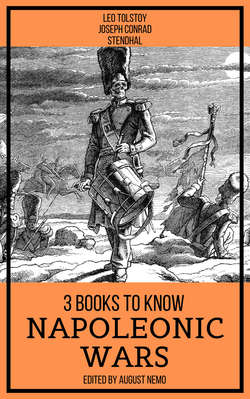Читать книгу 3 books to know Napoleonic Wars - Джозеф Конрад, Leo Tolstoy, Ford Madox Hueffer - Страница 4
На сайте Литреса книга снята с продажи.
ОглавлениеAuthors
JOSEPH CONRAD (3 December 1857 – 3 August 1924) was a Polish-British writer regarded as one of the greatest novelists to write in the English language. Though he did not speak English fluently until his twenties, he was a master prose stylist who brought a non-English sensibility into English literature. Conrad wrote stories and novels, many with a nautical setting, that depict trials of the human spirit in the midst of what he saw as an impassive, inscrutable universe. Conrad is considered an early modernist, though his works contain elements of 19th-century realism.[3] His narrative style and anti-heroic characters have influenced numerous authors, and many films have been adapted from, or inspired by, his works. Numerous writers and critics have commented that Conrad's fictional works, written largely in the first two decades of the 20th century, seem to have anticipated later world events.
Stendhal, pseudonym of Marie-Henri Beyle, (born January 23, 1783, Grenoble, France—died March 23, 1842, Paris), one of the most original and complex French writers of the first half of the 19th century, chiefly known for his works of fiction. During Stendhal’s lifetime, his reputation was largely based on his books dealing with the arts and with tourism (a term he helped introduce in France), and on his political writings and conversational wit. His unconventional views, his hedonistic inclinations tempered by a capacity for moral and political indignation, his prankish nature and his hatred of boredom—all constituted for his contemporaries a blend of provocative contradictions. But the more authentic Stendhal is to be found elsewhere, and above all in a cluster of favourite ideas: the hostility to the concept of “ideal beauty,” the notion of modernity, and the exaltation of energy, passion, and spontaneity.
Count Lev Nikolayevich Tolstoy (9 September 1828 – 20 November 1910), usually referred to in English as Leo Tolstoy, was a Russian writer who is regarded as one of the greatest authors of all time. He received multiple nominations for Nobel Prize in Literature every year from 1902 to 1906, and nominations for Nobel Peace Prize in 1901, 1902 and 1910, and his miss of the prize is a major Nobel prize controversy. Born to an aristocratic Russian family in 1828, he is best known for the novels War and Peace and Anna Karenina, often cited as pinnacles of realist fiction. Tolstoy's fiction includes dozens of short stories and several novellas such as The Death of Ivan Ilyich, Family Happiness, and Hadji Murad. He also wrote plays and numerous philosophical essays. In the 1870s Tolstoy experienced a profound moral crisis, followed by what he regarded as an equally profound spiritual awakening, as outlined in his non-fiction work A Confession. His literal interpretation of the ethical teachings of Jesus, centering on the Sermon on the Mount, caused him to become a fervent Christian anarchist and pacifist. Tolstoy's ideas on nonviolent resistance, expressed in such works as The Kingdom of God Is Within You, were to have a profound impact on such pivotal 20th-century figures as Mahatma Gandhi and Martin Luther King Jr.
